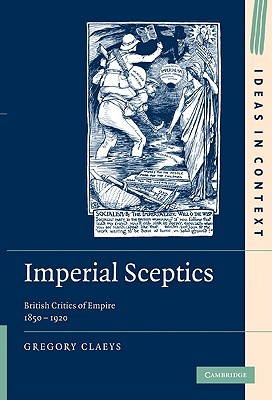
- We will send in 10–14 business days.
- Author: Gregory Claeys
- Publisher: Cambridge University Press
- ISBN-10: 0521199549
- ISBN-13: 9780521199544
- Format: 15.2 x 22.9 x 2.5 cm, kieti viršeliai
- Language: English
- SAVE -10% with code: EXTRA
Reviews
Description
Imperial Sceptics provides a highly original analysis of the emergence of opposition to the British Empire from 1850-1920. Departing from existing accounts, which have focused upon the Boer War and the writings of John Hobson, Gregory Claeys proposes a new chronology for the contours of resistance to imperial expansion. Claeys locates the impetus for such opposition in the late 1850s with the British followers of Auguste Comte. Tracing critical strands of anti-imperial thought through to the First World War, Claeys then scrutinises the full spectrum of socialist writings from the early 1880s onwards, revealing a fundamental division over whether a new conception of 'socialist imperialism' could appeal to the electorate and satisfy economic demands. Based upon extensive archival research, and utilising rare printed sources, Imperial Sceptics will prove a major contribution to our understanding of nineteenth-century political thought, shedding new light on theories of nationalism, patriotism, the state and religion.
EXTRA 10 % discount with code: EXTRA
The promotion ends in 23d.15:45:09
The discount code is valid when purchasing from 10 €. Discounts do not stack.
- Author: Gregory Claeys
- Publisher: Cambridge University Press
- ISBN-10: 0521199549
- ISBN-13: 9780521199544
- Format: 15.2 x 22.9 x 2.5 cm, kieti viršeliai
- Language: English English
Imperial Sceptics provides a highly original analysis of the emergence of opposition to the British Empire from 1850-1920. Departing from existing accounts, which have focused upon the Boer War and the writings of John Hobson, Gregory Claeys proposes a new chronology for the contours of resistance to imperial expansion. Claeys locates the impetus for such opposition in the late 1850s with the British followers of Auguste Comte. Tracing critical strands of anti-imperial thought through to the First World War, Claeys then scrutinises the full spectrum of socialist writings from the early 1880s onwards, revealing a fundamental division over whether a new conception of 'socialist imperialism' could appeal to the electorate and satisfy economic demands. Based upon extensive archival research, and utilising rare printed sources, Imperial Sceptics will prove a major contribution to our understanding of nineteenth-century political thought, shedding new light on theories of nationalism, patriotism, the state and religion.


Reviews